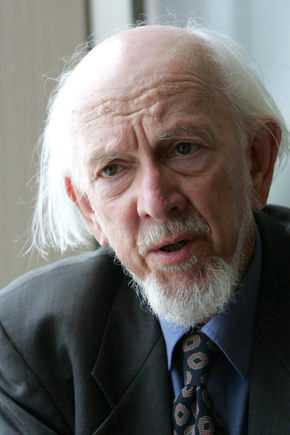Posted on : Nov.25,2006 12:47 KST
Modified on : Nov.27,2006 15:30 KST
S.K. only country with power to counter U.S., Japan
The U.S. may change its policy on Northeast Asia after the Republican party's defeat in mid-term elections, said Gavan McCormack, an emeritus professor at Australian National University.
Amid this climate, Professor McCormack said on November 24 that the only way to resolve the North Korean nuclear crisis is for South Korea to fend off pressures from the U.S. and Japan and to play a central role in the resolution. The biggest problem in the North Korean nuclear matter is that the meaning of the historical hardship suffered by North Korea leading up to today, from Japanese colonial rule and the Korean War to today's economic hardship, are being buried in oblivion, he continued.
South Korea, not China, is the only country that has the power to fend off the U.S, stressed McCormack, who is cited as one of the staunchest opponents against current U.S. policy on North Korea.
McCormack said the U.S. should take the responsibility for North Korea feeling prompted to develop nuclear weapons. What North Korea has learned is the fact that the U.S. and other nuclear states have threatened nations that do not possess nuclear weapons, he said. Is it surprising, then, that North Korea has developed nuclear weapons to defend itself? McCormack questioned.
He also criticized Japan, calling the biggest problem there the lack of room for understanding of or sympathy for North Korea. Former Japanese prime minister Junichiro Koizumi himself had tried to change the mood, but he did not have the leadership capability to cope with Shinzo Abe and other right-wing politicians, he said.
However, Professor McCormack said, after the U.S. mid-term election, the voice of the anti-U.S. camp is gaining strength within Japan's ruling party. There are worries in Japan over the seeming U.S. attitude of accepting China as a strong power in the East Asia, giving the anti-U.S. camp more clout. Though this seems paradoxical, the emergence of anti-U.S. right-wing politicians is a positive development for Japan to "return" as a part of Asia, he said. Since Japan's Meiji Restoration in the 19th century, it has leaned more toward the West rather than the East. Japan has also been estranged from other East Asian nations due to the legacy of colonialism and World War II, as well as Tokyo not being forthcoming about apology on certain issues.
Professor McCormack said he expects South Korea, which has the most developed civic movement in the region, to play a role in resolving the North Korean nuclear matter. South Korea, which has maintained a rational approach to the issue since the Kim Dae-jung administration, should fend off hard-line pressure on the North from the U.S. and Japan, he said. In addition, South Korea should guide North Korea to follow the South's model of political and economic development, the professor said.
Commenting about the South Korean government's dilemma over North Korea's human rights, Professor McCormack said Seoul has taken a rational approach to the issue so far. In North Korea, he said, we cannot expect human rights that match those of Western countries in only a short time. As we have seen in China and South Korea, answers for human rights matters should come from North Korea internally, according to the professor. Economic and political development is key for this change; the matter of survival is more important than citizens having the right to vote, he continued.
Born in Australia, McCormack studied Japanese, Chinese, and history in Japan and Britain. He is now researching nationalism in East Asia.
Please direct questions or comments to [englishhani@hani.co.kr]

